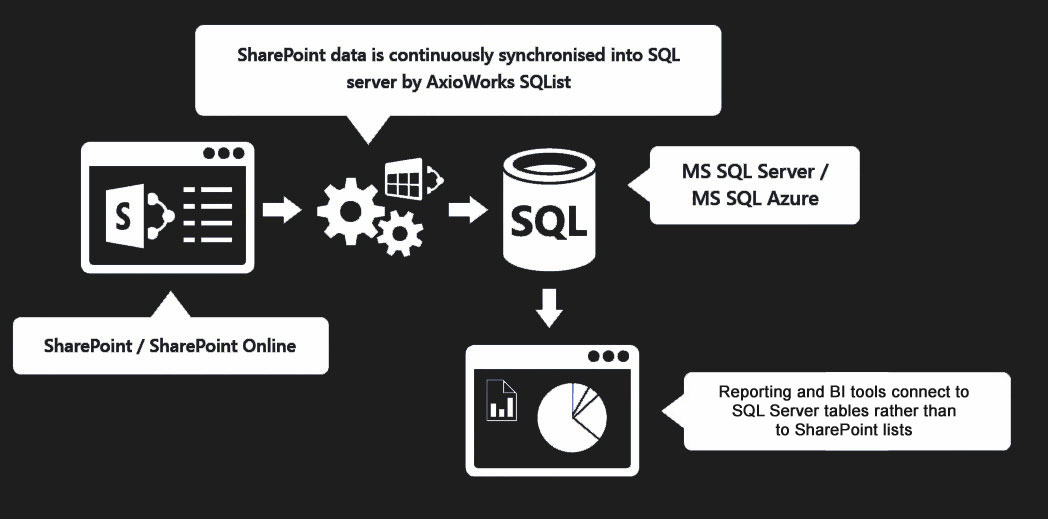SharePoint is a powerful collaboration and content management platform used by many organizations for storing and managing data. However, SharePoint has its limitations when it comes to data analysis and reporting, making it difficult to extract valuable insights from the data. This is where exporting SharePoint data to SQL Server comes in as the best way to access SharePoint data without any of the limitations of SharePoint. In this article, we will explore the benefits of exporting SharePoint data to SQL Server and how it can help organizations make better use of their data.

AxioWorks SQList continuously export SharePoint lists and libraries as normalised SQL Server tables, making live SharePoint data available to reporting tools like Power BI, Crystal Reports, or SSRS.
Improved Performance and Scalability
SharePoint has performance and scalability limitations, particularly when it comes to dealing with large datasets. Exporting SharePoint data to SQL Server can significantly improve the performance of data analysis and reporting. SQL Server is designed to handle large datasets and can optimize queries for better performance. Additionally, SQL Server can scale vertically and horizontally, making it easy to add more resources to handle increasing data loads. By exporting SharePoint data to SQL Server, organizations can take advantage of SQL Server’s performance and scalability to analyse data quickly and accurately.
Better Data Analysis and Reporting
SharePoint has limited reporting capabilities, which can make it difficult to extract valuable insights from data. On the other hand, SQL Server provides robust reporting tools that can generate customized reports and dashboards to help organizations make data-driven decisions. By exporting SharePoint data to SQL Server, organizations can use SQL Server’s reporting tools to analyse data from different angles, identify trends, and gain deeper insights into business performance. SQL Server’s reporting tools can also help organizations to create reports that meet compliance and regulatory requirements, providing a single source of truth for data analysis and reporting.
Easier Integration with Other Applications
SharePoint is a standalone application, which means that integrating it with other applications can be challenging. On the other hand, SQL Server is a widely used relational database management system that can easily integrate with other applications. By exporting SharePoint data to SQL Server, organizations can integrate SharePoint data with other applications, such as business intelligence tools, data visualization tools, and enterprise resource planning (ERP) systems. Integrating SharePoint data with other applications can help organizations gain a more holistic view of their business performance and make better use of their data.
Improved Data Security and Compliance
SharePoint has security and compliance limitations, particularly when it comes to sensitive data. Exporting SharePoint data to SQL Server can improve data security and compliance by providing more robust security features and controls. SQL Server provides advanced security features, such as encryption, authentication, and authorization, to protect data from unauthorized access. Additionally, SQL Server can help organizations to comply with regulatory requirements, such as HIPAA and GDPR, by providing auditing and reporting capabilities. By exporting SharePoint data to SQL Server, organizations can ensure that their data is secure and compliant, reducing the risk of data breaches and regulatory penalties.
Conclusion
Exporting SharePoint data to SQL Server is the best way to access SharePoint data without any of the limitations of SharePoint. By exporting SharePoint data to SQL Server, organizations can take advantage of SQL Server’s performance, scalability, and reporting capabilities to analyse data quickly and accurately. Additionally, exporting SharePoint data to SQL Server can help organizations to integrate SharePoint data with other applications and improve data security and compliance. Organizations that export SharePoint data to SQL Server can gain deeper insights into their business performance, make better use of their data, and gain a competitive advantage.
However, it’s important to note that exporting SharePoint data to SQL Server requires careful planning and execution to ensure that the data is exported correctly and that it is secure and compliant. Organizations should work with experienced SharePoint and SQL Server professionals to ensure that the export process is carried out correctly and that the data is integrated with other applications securely and compliantly. Alternatively, organizations can use a reliable third-party tool, such as AxioWorks SQList (www.axioworks.com/sqlist/), to export SharePoint data to SQL Server in a fully normalized format, ensuring accurate data extraction and smooth integration with other applications. AxioWorks SQList provides organizations with a reliable and efficient solution to overcome SharePoint’s limitations and make better use of their data.
AxioWorks SQList continuously export SharePoint lists and libraries as normalised SQL Server tables, making live SharePoint data available to reporting tools like Power BI, Crystal Reports, or SSRS.